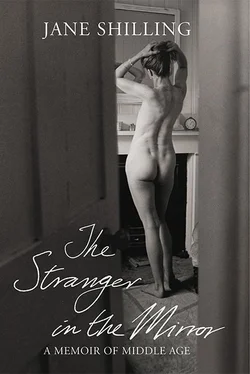Meanwhile I notice that my contemporaries have gone quiet. The bold candour with which we always used to report to each other from the front lines of our lives has been replaced with a muffled discretion. Once upon a time we couldn’t wait to tell the next episode. The vagaries of our lovers, our employers, our parents, our shopping habits, our looks – all became part of a rolling comic monologue.
With pregnancy and childbirth, a rich new vein of material emerged: the preposterous indignities of pregnancy, from the moment your navel pops inside out, mutating overnight from a sexy hollow to a ludicrous fleshy bobble, to the weary realisation, towards the end of gestation, that you’d pull down your knickers and offer your underparts for examination to almost anyone who demanded it with sufficiently crisp authority; the outrageous shock of labour, the unexpected catastrophe of raw feeling – rage, exhaustion, terror, boredom, love – with which the passionate intensity of motherhood is compounded.
Time passed, the children began to grow up, but still the conversation continued: more fractured now, and at longer intervals, reduced by the rending demands of work and family; the savage battle to secure some scraps of time in which to remind oneself of who one used to be, from a daily soap opera to erratic messages in bottles, brief bulletins flung into the overwhelming tides of domesticity, often saying little more than, ‘I am still here. Are you?’
And then, towards the late mid-forties, even the messages in bottles seemed to dwindle to near silence. It took a while to notice, so long were the spaces of time between them, so uncommunicative the contents when they came – little more informative, mostly, than the births, deaths and marriages columns of the newspapers. It was as though the well of discourse had dried up. No intimacy, before, had been too secret to anatomise. But now the vanishing of youth – even the prospect of its loss – seemed to provoke a collective late crisis of discretion.
Perhaps it was less modesty than uncertainty that tied our tongues. Early one summer morning, I suddenly caught sight of my three-quarter profile in the bathroom mirror with its harsh side light, and noticed that my whole eye seemed to have sunk into its orbit, so that you could clearly see the bony lineaments of the eye socket beneath the skin. Face-on, the violet under-eye smudges which had been there since adolescence – a flaw so familiar that, like my crooked incisors, or the dent on the side of my nose where I walked into a lamp post while reading a book, I scarcely registered them – seemed to have migrated.
Instead of a faint mauvish tinge extending from the inner corner of the eye to just below the pupil – a look whose overtones of romantic exhaustion I relished so much in my teens that I used to emphasise it with purple eyeshadow – there was a livid indigo streak extending in a semicircle along the lower border of my eye socket. Above it, the skin was lighter – a greenish-bronze that lent the whole under-eye a pouched, bruised look from which my eyes (were they more hooded, too, than formerly, the upper lids?) gazed back like those of a dismayed tortoise.
Appalled, I gave up alcohol altogether, took to drinking two litres of water a day, mixed with drops of cleansing and energising tincture from brown glass bottles, went to bed each night as the 10 o’clock news began and spent £100 on a cream guaranteed (said the advertisements) to banish severe under-eye circles. The results of this regime were dramatic. I felt magnificent: far more vigorous and engaged with life than I had in my wretched and emotionally unstable twenties and early thirties. Every morning that summer I woke at first light and sprang out of bed with a feeling almost of bliss, avid for the day to come. But every morning from the bathroom mirror there gazed back the same ruined, saurian regard.
Eventually, ‘I think my looks have gone,’ I hazarded to one of my oldest friends; one of several with whom I’d grown up, talked my way through love and its failures, pregnancy, madness, bereavement, disaster of all sorts, turning catastrophe into stories and making it manageable in the process. If I was hoping for reassurance, it didn’t come. ‘It happens very quickly,’ she said, and shut up with a snap, so abruptly that I understood (at last) that there was a kind of superstition at work; a contrary magic: if you don’t speak about the loss of youth and beauty, of charm, of sexual allure and the power to beguile, to order the world into a form that suits you – then by not acknowledging it, for a while you can conjure away, abjure the terrible thing.
There is a difference between the dramas of early adulthood and the accumulated small losses of middle age. The former, however wrenching, conceal somewhere within themselves a tiny grain of excitement; a minute satisfaction at being the star of whatever scene is unfolding. Even while suffering, one is captivated, because eager to know how this bit of the story will turn out. But the outcome of middle age is not in doubt. The only ambiguity is the speed of the process, not its conclusion. It is (and this, for women accustomed to use words as the implements with which to hew and chip and carve their destiny into shape, is almost the most alarming thing about it) impervious to the power of conversation.
And so one advances towards it, moving towards the uncertain future as though through dense woods or across fogbound marshes, not quite alone, but unable to see clearly how one’s companions are getting on. You know they are there; can hear their distant cries of warning or encouragement; but they remain hidden: wrapped, as you are, in a cloak of double invisibility whose effect is that you can see, for the moment, only the enveloping cloud of mist or dark leaves that parts before you as you advance, and closes again behind you.
At any moment, you think, you may cleave through the damp vapour, the clawing twigs, and emerge into a sunlit clearing with hills and fields spread out before you; or on to the bright shoreline with a view of the distant horizon. At that moment your destination will become clear, and the route you must take to reach it. But for the moment, all you can do is move gropingly towards the clarity that lies (you hope) on the other side of the mist.
However stealthy the advance of middle age, there is inevitably an instant of moral drama when you understand that it has caught up with you. You catch sight of a careworn hag approaching you in a clothes shop and find she is your own reflection; your child implores you to wear something more conventional to parents’ evening; you miss a period and panic that you might be pregnant before realising with stupefaction that your days of worrying about (or longing for) pregnancy are past. For me the moment of drama came with a fall from a horse on a luscious morning in early summer.
Falling off a horse was something I did with bruising frequency in my middle years – though as I got older, I began to harbour a certain pride in my ability to bounce. At least, I used to say to myself as I got up – winded, stunned, battered, but not badly hurt – from flying through the air and landing with a grievous thump… At least I haven’t got osteoporosis – yet.
The act of falling, vehemently disapproved of by good riders, for whom a physical fall has the same dire overtones of shame and moral disorder as the original biblical Fall, held for me a perverse romance: a mixture of the human longing to fly and the cheating of fate. Standing by the final fence at a point-to-point on a fine spring day I saw a jockey hurled from the saddle as though from a catapult. He flew a long, beautiful arc through the bright air, curled up like a hedgehog on the turf, hands clasped over the fragile nape of his neck among the melee of metal-shod hooves, and once the thunderous field of galloping horses had passed he rose, furious, humiliated, marvellously alive. Then he stamped back to the paddock to find his next ride and do the same thing all over again.
Читать дальше












